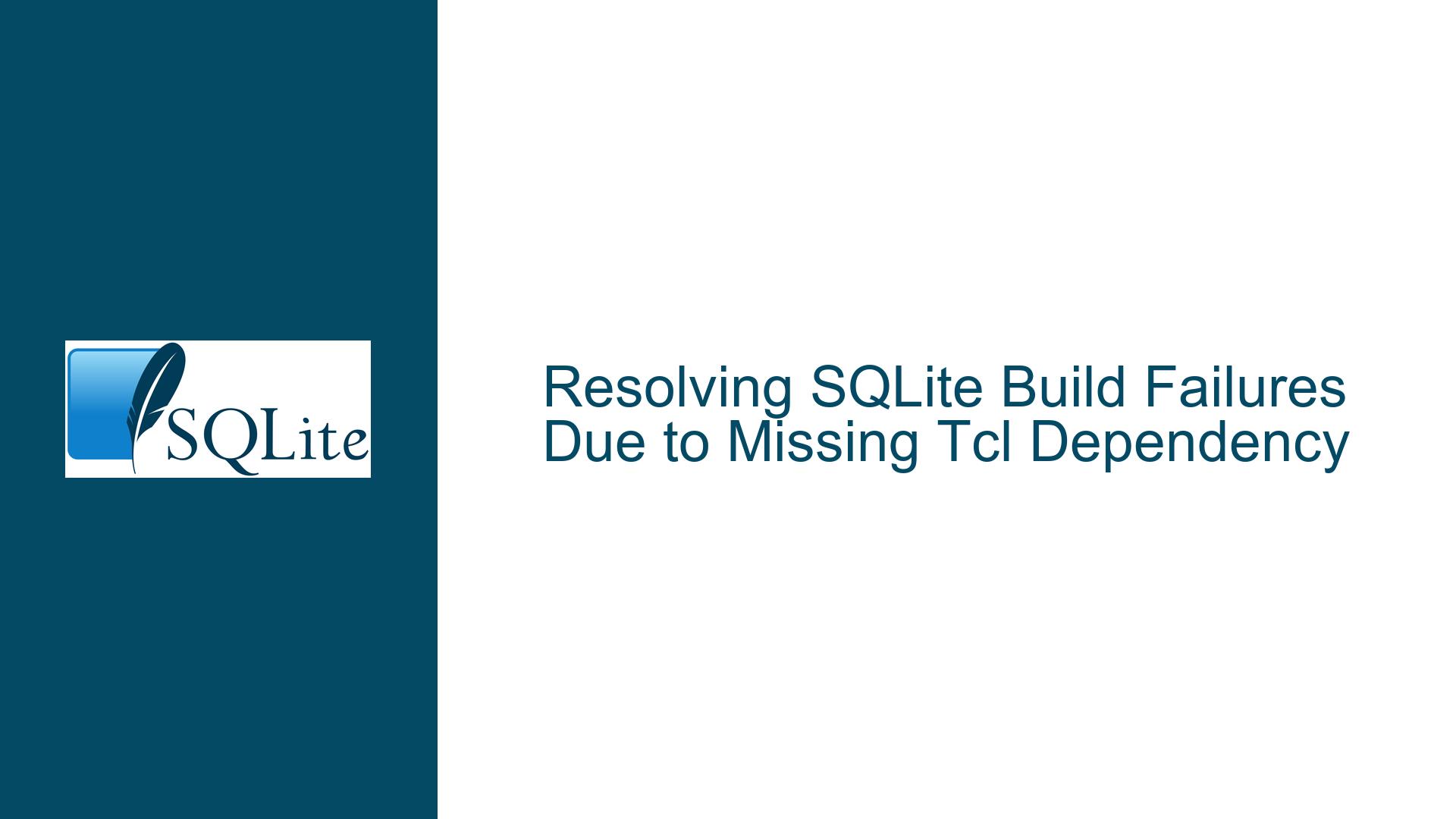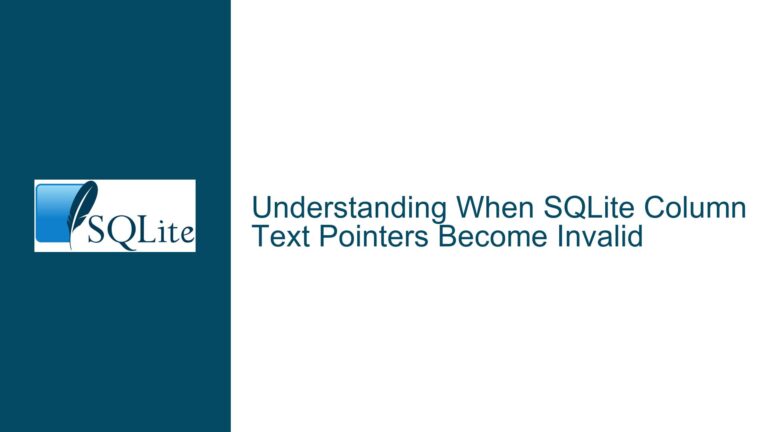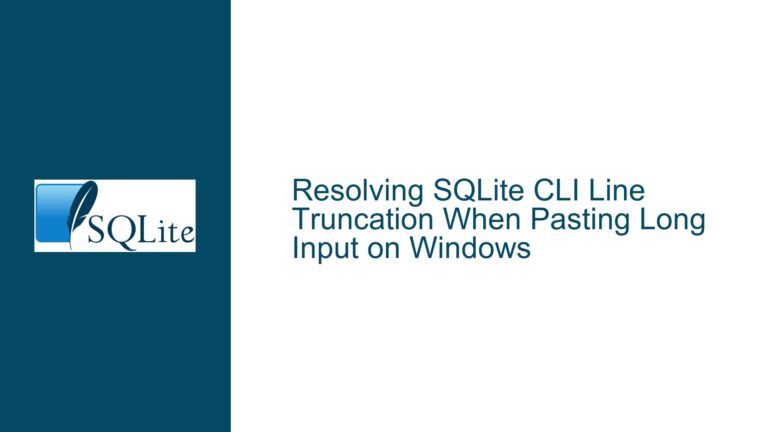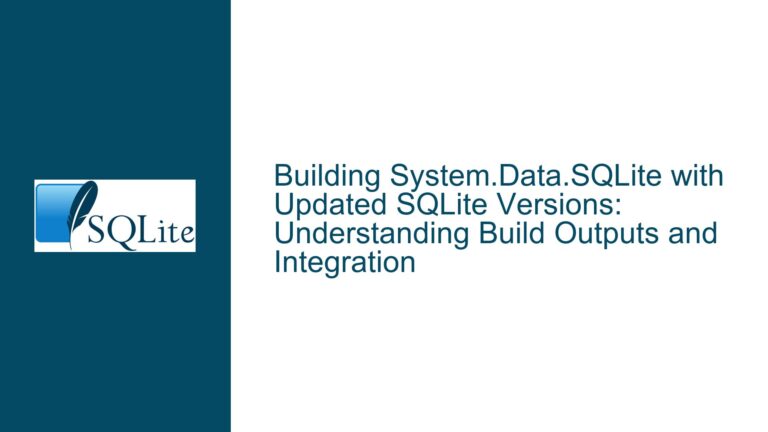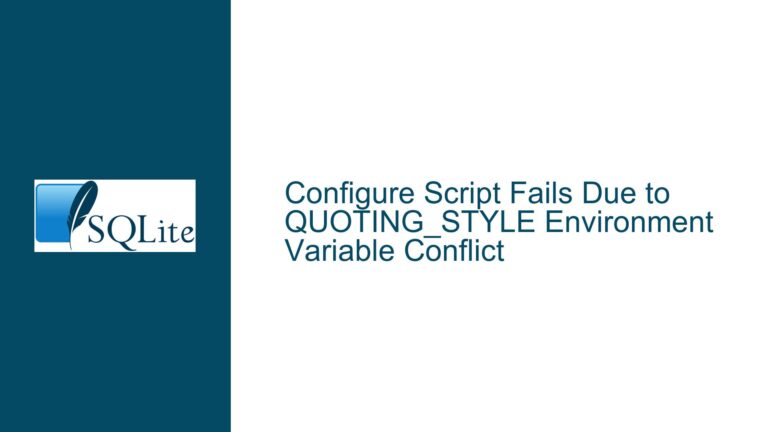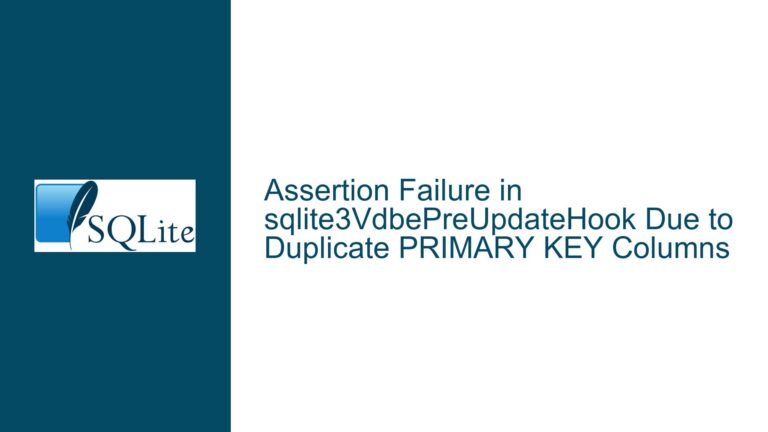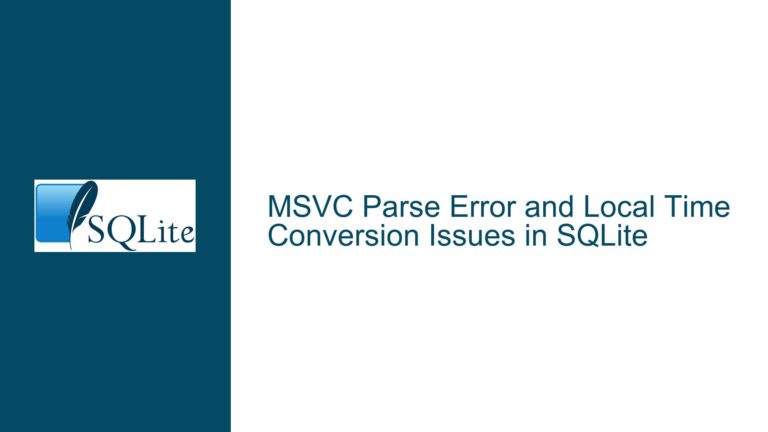Resolving SQLite Build Failures Due to Missing Tcl Dependency
Build Errors During SQLite Compilation Without Tclsh Dependency
When compiling SQLite from source code obtained directly from the official SQLite source distribution (e.g., sqlite-src-*.zip or sqlite-src-*.tar.gz), developers may encounter build failures related to missing dependencies on Tcl tooling. The core issue arises when the build process attempts to generate critical header and source files (such as sqlite3.h and sqlite3.c) using Tcl scripts. These scripts require the presence of a Tcl shell interpreter (tclsh) to execute. If tclsh is not installed or is not discoverable by the build system, the compilation process will fail with errors such as:
/bin/sh: line 1: tclsh: command not found
make: *** [Makefile:1110: sqlite3.h] Error 127
The problem is exacerbated by the behavior of the SQLite configure script, which issues warnings about the absence of Tcl but does not halt execution. This creates a false impression that the build can proceed without Tcl, only for compilation to fail later. For example:
configure: WARNING: Can't find Tcl configuration definitions
configure: WARNING: *** Without Tcl the regression tests cannot be executed ***
configure: WARNING: *** Consider using --with-tcl=... to define location of Tcl ***
The configure script completes successfully, generating a Makefile that assumes certain targets can be built without Tcl. However, the generated Makefile includes rules that invoke Tcl scripts unconditionally. When make is executed, these rules attempt to run tclsh, resulting in fatal errors. A secondary issue arises when shell redirection in Makefile rules creates empty files (e.g., sqlite3.h) after failed Tcl script executions. Subsequent compilation steps then fail with cryptic compiler errors due to incomplete or malformed header files.
Insufficient Tcl Tooling and Misleading Configure Script Warnings
The root cause of the build failure is the SQLite build system’s dependency on Tcl for generating source files during compilation. This dependency is not optional when building from the raw source distribution. The configure script checks for the presence of tclsh but does not treat its absence as a fatal error. Instead, it defaults to a "non-amalgamation" build configuration, which still requires Tcl for generating headers and other artifacts. This creates a contradiction: the build system warns about potential limitations but does not account for the fact that Tcl is mandatory for even basic compilation steps.
Key Factors Contributing to the Issue:
Tcl Dependency in Source Generation
SQLite uses Tcl scripts (e.g.,tool/mksqlite3h.tcl) to generate consolidated header files and other build artifacts. These scripts are invoked during themakephase, and their execution is required regardless of whether an amalgamation (single-file source) or non-amalgamation build is selected. The amalgamation build process itself is Tcl-dependent, but even non-amalgamation builds require Tcl for critical steps.Non-Fatal Configure Warnings
Theconfigurescript emits warnings about missing Tcl but proceeds to generate aMakefilethat assumes Tcl is available. This violates the principle of fail-fast configuration, where missing critical dependencies should result in immediate termination. The warnings are misleading because they imply that only regression testing (not the core build) is affected by the absence of Tcl.Shell Redirection Side Effects
TheMakefilerules for generating header files use shell redirection (e.g.,tclsh tool/mksqlite3h.tcl > sqlite3.h). Iftclshis missing, the redirection creates an emptysqlite3.hfile. Subsequentmakeinvocations detect that the file exists (even though it is empty) and proceed to compile source files that include it, leading to nonsensical compiler errors.Ambiguity in Source Distributions
The SQLite project provides multiple source packages. Thesqlite-src-*.zipdistribution contains raw source files and requires Tcl for compilation. Thesqlite-autoconf-*.tar.gzdistribution includes pre-generated amalgamation files and does not require Tcl. Users unaware of this distinction may attempt to build the raw source distribution without Tcl, leading to avoidable errors.
Installing Tclsh, Utilizing Amalgamation Builds, and Build Process Adjustments
To resolve the build failures, developers must address the Tcl dependency, adjust their build configuration, or use pre-amalgamated source distributions. Below are detailed solutions and workarounds:
1. Install Tclsh and Tcl Development Tools
The most straightforward solution is to install Tcl. On Debian/Ubuntu systems:
sudo apt-get install tcl-dev tclsh
On Red Hat/CentOS systems:
sudo yum install tcl-devel tcl
After installation, verify that tclsh is in the PATH:
which tclsh # Should return a path like /usr/bin/tclsh
Re-run configure and make after installing Tcl. The build should proceed without errors.
2. Use the Amalgamation Source Distribution
The sqlite-autoconf-*.tar.gz package includes pre-generated amalgamation files (sqlite3.c and sqlite3.h), eliminating the need for Tcl during compilation. Download this package from the SQLite download page and extract it:
tar xzf sqlite-autoconf-3430100.tar.gz
cd sqlite-autoconf-3430100
./configure
make
3. Modify the Build Process to Skip Tcl-Dependent Targets
If installing Tcl is not feasible, modify the Makefile to skip Tcl-dependent rules. Locate lines in the Makefile that invoke tclsh (e.g., rules for sqlite3.h or sqlite3.c) and replace them with no-op commands. For example:
sqlite3.h:
@echo "Skipping Tcl-dependent target sqlite3.h"
This approach is not recommended for production builds, as it may result in incomplete or incorrect binaries.
4. Patch the Build System to Fail Early
Modify the SQLite configure script or Makefile.in to treat missing Tcl as a fatal error. In configure.ac, add:
AC_CHECK_PROG([TCLSH], [tclsh], [tclsh], [AC_MSG_ERROR([tclsh is required to build SQLite from source])])
Regenerate the configure script with autoreconf and rebuild. This ensures that the configure step fails immediately if Tcl is missing.
5. Clean Intermediate Files After Failed Builds
If a failed build leaves behind empty or corrupted files (e.g., sqlite3.h), delete them before reattempting the build:
make clean
rm -f sqlite3.h sqlite3.c
Then install Tcl or switch to the amalgamation distribution.
6. Leverage SQLite’s Official Fixes
The SQLite development team has addressed part of this issue by updating the Makefile to prevent empty file generation. Ensure you are using the latest version of the source code, where missing tclsh results in an early error:
ERROR: This makefile target requires tclsh 8.4 or later.
Update the source tree or apply patches from the SQLite repository to benefit from these fixes.
By understanding the Tcl dependency chain, selecting the appropriate source distribution, and leveraging build system adjustments, developers can avoid or resolve SQLite compilation errors related to missing tclsh. Always prefer the amalgamation distribution for Tcl-free builds, and validate the integrity of generated files after build failures.
